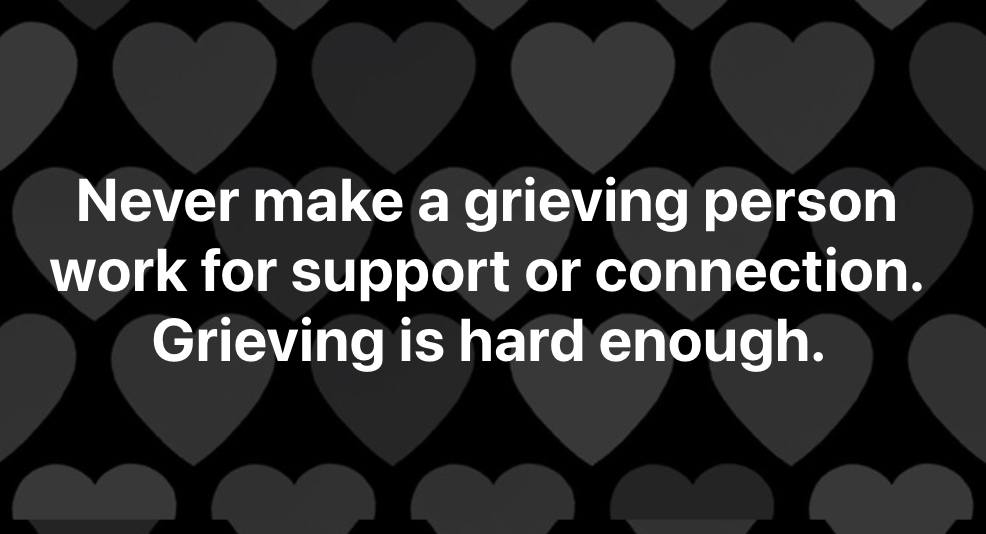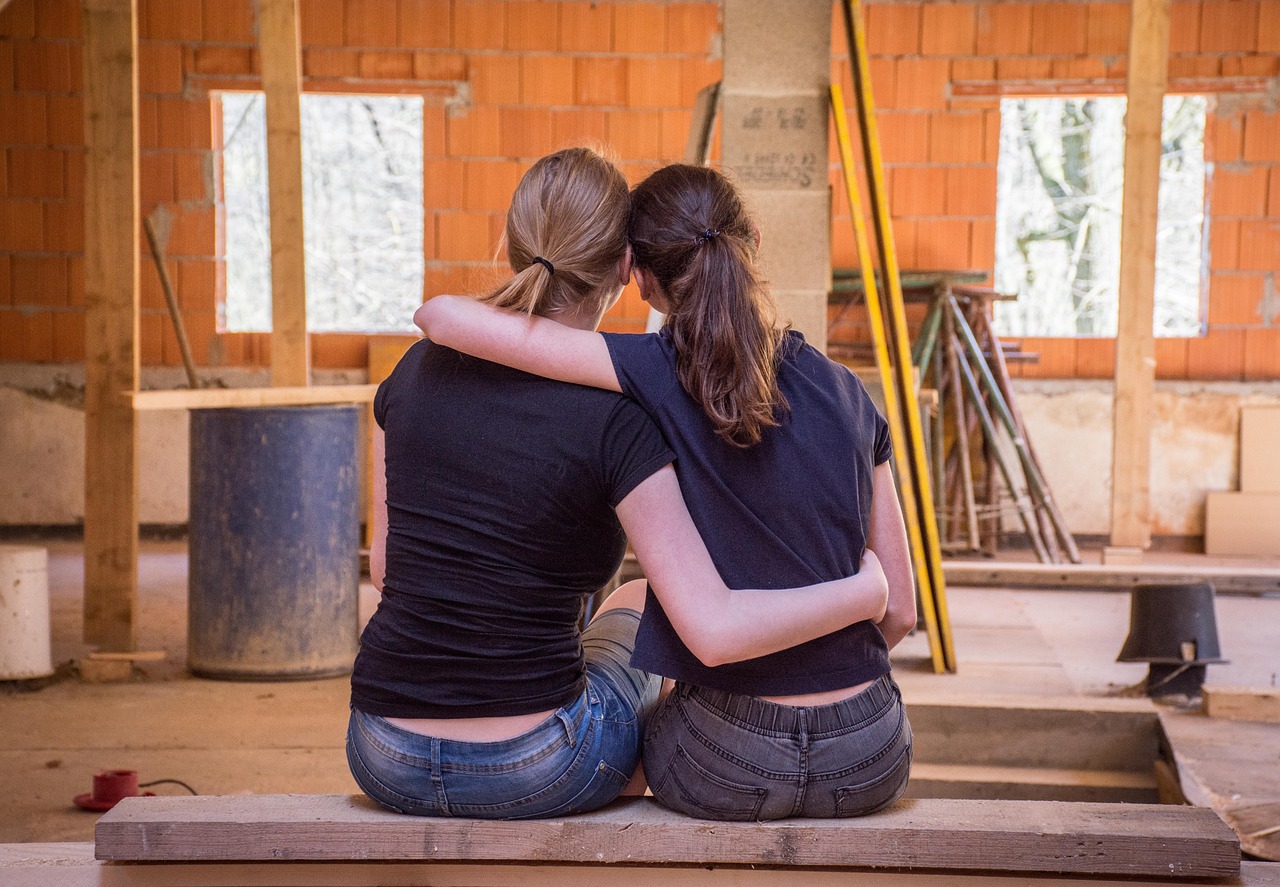
In September 2022 someone I loved deeply passed away after a rapid onslaught with cancer. On May 1st 2023 my best friend who I have been living with for 20 years passed away from sepsis and cancer. Both losses came rapidly, both people I physically cared for near the end of their lives.
JUMP TO BULLET POINT LIST OF WHAT TO DO
In June 2023 I came to some realisations of how people treat those grieving. Some positive, some not.
So I wrote a short post on Facebook because I wanted people to know how to be around someone grieving a close personal loss.
This sort of loss isn’t a distant relative or a friend that you may see from time to time, but someone who you were intimate with be it physically, mentally/emotionally or both.
I was watching a documentary on people who had lost their spouses and also a talk by a woman who lost her husband. One thing they all had in common was the fact that they really got to see who their friends were when they lost their beloveds.
Apart from the well-meaning, but unhelpful things people say to people facing intense loss (‘They’re in a better place’ ‘Time heals’, ‘Maybe it’s time you moved on’ etc..), one thing they all had in common was that some people in their friendship circles and family circles simply arrived at the funeral or after the loss and said ‘We’re here if you need us, give us a call’.

When you have lost someone deeply close, often the most you can do is feed yourself (if you can even do that!), it isn’t your job to chase for help or support or connection.
If you genuinely want to support a grieving widow, parent, son or daughter, or someone, who like me has lost someone who is ‘like’ a husband, do what those who are being great Godsends to me right now, keep in touch, ask ‘How are you’ ‘Have you eaten today?’ ‘What can I bring you?’
Bring Food
I know I’m not eating well right now, i’m just eating, but not paying attention to what I eat. So I’ve been eating more tinned food, frozen food, not much fresh right now because grief is all consuming. Considering eating healthy does not even enter my mind, easy food is what I need.
If you genuinely wish to support someone, offer to help, but you must follow it up with action. If you don’t it feels disheartening and due to grief we start to look to see who our true friends are during life crisis and we may choose to let your friendship go.
Why?
Because we need to know we can trust those we have around us during times of life trauma. We need to know that you are a safe person who will be there for us at times of challenge. And those who stick around will soon find over time the grieving person will be there for them through any future life crisis that they may experience. When we are going through trauma we notice these things and we remember.
Help Clear The Home

My good friend Louisa took me to the tip last week, we sat for coffee in my garden for a couple of hours, she tried to help me drain my broken washing machine, but alas even with both of us trying we could not turn the knob as it was so tight so I called out the engineer.
Dropping by with care packages, hugs and knowing someone is there if I can’t cope makes a huge difference to this painful journey I am experiencing. And being with people who are willing to talk about hard stuff and who are not scared of feelings.
In the past week I just didn’t know why I should be here anymore on planet earth, my thoughts were very dark. I would not do anything like suicide, but grieving people have these thoughts, when the house is empty and the heart feels heavy, we have these thoughts. When the person who knew you inside and out is no longer there you have thoughts of joining them. This is a normal part of grieving, but check in on your grieving friend to make sure they don’t go down this route.
So if you genuinely care and love someone in your life who is grieving, don’t just offer out your phone number for them to call you or contact you, you contact them and you genuinely offer them help and support. Let them let you know when you see them what they need from you, be open to what they need.
Sometimes we need distraction, sometimes we just need someone there to sit with us while we cry.
Sometimes we need food.
Sometimes we need help to manage stresses like appliance breakdowns or clearing the house of our loved ones clothing and items.
But don’t offer these things unless you mean to help.
This seems to be something that happens to many who grieve a close loved one.
Only offer if you can humanly do this, otherwise it can be very disheartening to the grieving human.
And please ask the grieving person if they would like company or to be left alone (it can change from week to week so keep asking), it’s easy to assume we want to be alone and a lot of the time we may want time alone, but remember that if we have shared a home with someone who has died we are spending far more time alone than we ever did. Your visit may help remind us that there is a world outside grief and pain.

WHAT TO DO TO HELP A GRIEVING LOVED ONE
- Ask them what they need right now
- Only offer to help if you definitely can follow through
- Take your loved one or friend food, do this regularly, especially in the first month but even beyond that too. Food that can be easily heated up. In my first two weeks after Michael passed I could only really stomach a banana and a few walnuts, the thought of cooking tired me out.
- Offer to help clear the house, offer to be there when the grieving person is clearing out their lost loved ones room or their spaces. Clearing the home is the most traumatic experience. It can take a long time because each item has memories and can result in lots of crying. Someone with more energy and a clearer head can take items and bag them up, can move items, can be there for comfort when it just becomes too much. Don’t offer to do this on your time, do it on their timing. Some may wait months to do this, others may want it done swiftly so they can begin the healing process.
- Take what needs to go to the tip for your friend or family member
- If a woman has lost a husband or partner and is on their own for the first time in a long time and you are a man (this is not sexist) offer to help with the physical parts of life while she gets used to doing things herself. Things like moving heavy furniture, hammering, using drills, tools that she may never have used before if her partner took care of that side of things. As time goes on offer to show her how to use the tools, be there for things that she feels too vulnerable to do with when grieving. I moved my living room around, my friends bedroom, I could have done with strong hands to help me. My washing machine broke, I could not turn the filter valve it was too tight. My loft hatch door broke and slammed on my hand. I felt broken inside and my home felt like it was breaking around me, I had to cry through ordinary chores that Michael would have been able to do easily. I was like a new baby learning to walk and still am.
- Offer to take your grieving friend or family member out for walks in nature, gentle walks, not over exerting them. Being outdoors can be incredibly soothing and nurturing.
- Invite them to small intimate gatherings, they may decline your invitation, but to continue being part of life it is important to still be included.
- If you do visit, pay attention to how your family member or friend looks. If they look tired after a while ask if they would like you to leave so that they can rest. They may be too polite to ask you to leave. Offer to make them tea or coffee in their own home, especially in the first two weeks, because brain fog can be intense and make even the simplest tasks hard.
- Offer to help with the funeral or cremation organising, go with them to important meetings about this. Go with them to register the death as all of these things can be very emotional for someone grieving.
- A close loss can mean the person grieving keeps more busy in the first year working on moving things, changes being made, getting used to things, transferring things into their name, the second year or after 3-6 months they may find the grief hits more, especially if they have been using ‘doing’ to distract them from ‘feeling’. Be there, care, visit, feed, nurture. Let these be your family or friendship mantras when it comes to being there for them.
- Ask them every day ‘How are you doing today?’ ‘How did you sleep?’ ‘Are you eating okay?’ Let them know you are there consistently. When someone loses someone close their entire axis of safety has flipped upside down. They are shaking on quicksand and need constant reminders of safety, to feel safe again. Reliable and loyal friends and family members are very important to them.
And lastly, remember you are doing such a wonderful service to your loved one or friend. Your gift of time and energy can help heal and bring your friend or family member back into the light out of the darkness of grief. Be that light and they will never forget what you did for them.
